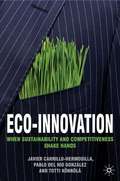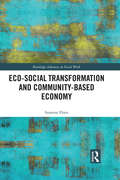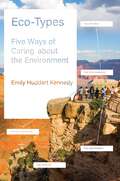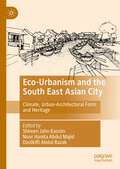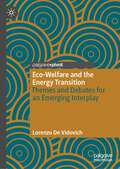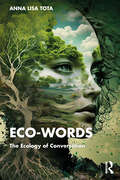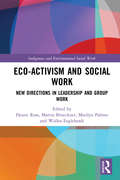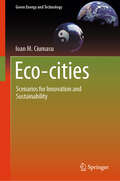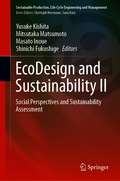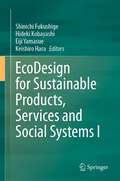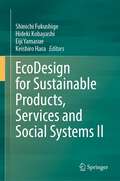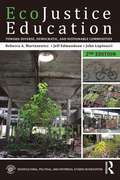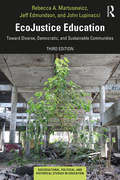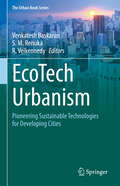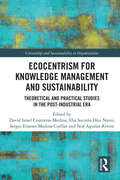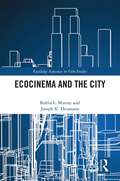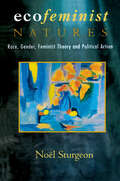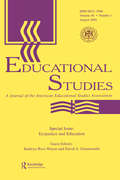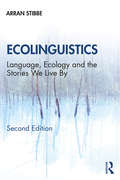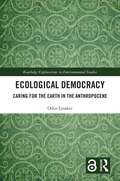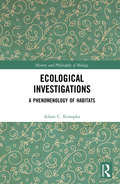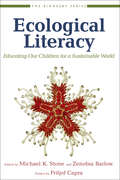- Table View
- List View
Eco-Innovation
by Javier Carrillo-HermosillaThis book considers the impact industry has on our environmental surroundings while exploring the need for more sustainable development. The concept of sustainable development and the general understanding of the interdependence of the environment and the economy are both examined in this thought-provoking new book.
Eco-Social Transformation and Community-Based Economy (Routledge Advances in Social Work)
by Susanne ElsenWorldwide societal problems such as mass unemployment, growing social disparities, public and private poverty, social exclusion, environmental destruction and the evidence of climate change are increasing and becoming ever more visible. They require urgent and sustainable long-term solutions. Eco-Social Transformation and Community-Based Economy provides a transdisciplinary conception of community based socially productive approaches to eco-social transformation and sustainability. It introduces interdisciplinary discourses, basic theoretical concepts, participatory and community-based research, development strategies and practical prospects and considers them in the context of both eco-social transformation and eco-social work, especially with disadvantaged groups. With case studies that demonstrate the creative power of local embeddedness, diversity and cooperation, this book presents integrative local approaches as convincing examples of possible ways forward. It will be of interest to all scholars, students and activists working in community development, social development, social work and human geography.
Eco-Thoughts: Conversations with a Polluted Mind
by Anna Lisa TotaWhat if the pollution of the world did not only concern the environment in which we live, but also the flow of our thoughts in every moment of everyday life? What if those thoughts, invasive like locusts, could transform and become "eco-thoughts" that make us and others feel good? Ecology concerns us from the inside, passes through us, and literally shapes us: "what is inside is outside". This book offers "eco-words" and "eco-thoughts" as it sheds light on the traps that our minds construct for ourselves, that we so often fall into whether we mean to or not. It examines the erroneous paths that we sometimes meander down while we are thinking in our everyday lives in order to help us to identify and avoid them.The thoughts we formulate are not really ours, as if our mind prefers to flow in what has already been thought, lived, and felt. The author offers her reflections and insights to those who wish to direct their minds towards streams of thought that really do belong to us, that make us feel good. In order to do this, we must learn how to disable the “traps” and free ourselves of what is “contaminating” before they take hold and harm us.An original and thought-provoking examination of how are own internal lives can become toxic, and how to prevent this, that will be of particular value to students and scholars of sociology, philosophy, communication studies, memory studies, and social psychology.
Eco-Types: Five Ways of Caring about the Environment
by Emily Huddart KennedyWhy acknowledging diverse eco-social relationships can help us overcome the political polarization that undermines our ability to protect the environmentWhen we picture the ideal environmentalist, we likely have in mind someone who dedicates herself to reducing her own environmental footprint through individual choices about consumption—driving a fuel-efficient car, for example, or eating less meat, or refusing plastic straws. This is a benchmark that many aspire to—and many others reject. In Eco-Types, Emily Huddart Kennedy shows that there is more than one way to care about the environment, outlining a spectrum of eco-social relationships that range from engagement to indifference.Drawing on three years of interviews and research, Kennedy describes five archetypal relationships with the environment: the Eco-Engaged, often politically liberal, who have an acute level of concern about the environment, a moral commitment to protect it, and the conviction that an individual can make a difference; the Self-Effacing, who share the Eco-Engaged’s concerns but not the belief in their own efficacy; the Optimists, often politically conservative, who are confident in their relationship with the environment, doubt the severity of environmental problems, and resent insinuations that they don’t care; the Fatalists, who are pessimistic about environmental decline and feel little responsibility to adopt environment-friendly habits; and the Indifferent, who have no affinity for any part of the environmental movement.Kennedy argues that when liberals feel they have a moral monopoly on environmental issues, polarization results. If we are serious about protecting the planet, we must acknowledge that we don’t all need to care about the environment in the same way.
Eco-Urbanism and the South East Asian City: Climate, Urban-Architectural Form and Heritage
by Shireen Jahn Kassim Noor Hanita Abdul Majid Dzulkifli Abdul RazakThis book traces the history of urban design in tropical South East Asia with a view to offering solutions to contemporary architectural and urban problems. The book examines how pre-colonial forms and patterns from South East Asian traditional cities, overlaid by centuries of change, recall present notions of ecological and organic urbanism. These may look disorganised, yet they reflect and suggest certain common patterns that inform eco-urban design paradigms for the development of future cities.Taking a thematic approach, the book examines how such historical findings, debates and discussions can assist designers and policy makers to interpret and then instil identities in urban design across the Asian region. The book weaves a discourse across planning, urban design, architecture and ornamentation dimensions to reconstruct forgotten forms that align with the climate of place and resynchronise with the natural world, unearthing an ecologically benign urbanism that can inform the future.Written in an accessible style, this book will be an invaluable reference for researchers and students within the fields of cultural geography, urban studies and architecture.
Eco-Welfare and the Energy Transition: Themes and Debates for an Emerging Interplay
by Lorenzo De VidovichThis book provides a comprehensive overview of the emerging interplay that runs between energy – seen as a basic need and a providential material service from the viewpoint of welfare studies – and eco-welfare, seen as an emerging analytical and policy paradigm that hold together the social crisis on the one hand, and the ecological crisis, on the other hand. At a time of energy transition, the interplay between the theoretical framework of eco-welfare and the topic of energy supply is little explored, and therefore, this book fills a need in the literature by providing a comprehensive framework to navigate this emerging relationship. Such a framework is strengthened by insights on energy poverty and renewable energy communities, identified as cornerstones of the analysis between energy transition and eco-welfare.
Eco-Words: The Ecology of Conversation
by Anna Lisa TotaHow many words do we use in a day? How many of them are actually necessary to convey the flow of our thoughts? And how many could we do without, if we were to fast, abstain from using words? This book examines the power of words. It explores the links between communication, language and identity, arguing for a certain gravity to the practice of speech, for offering only meaningful words to the people we talk to. We are the words we hear and utter, we are the words we think, and Anna Lisa Tota invites us to use “eco-words” to change the world we live in: “This book is a proposal to myself and to you, dear Reader, an invitation to change together: while you read and while I write, bridging the temporal and spatial gap that separates us and makes it impossible for us to help each other”. This volume will appeal to readers interested in the everyday practice of communication. It will also be useful to scholars and students of sociology, emotion, memory, body studies, philosophy, aesthetics, communication studies, psychology, and linguistics.
Eco-activism and Social Work: New Directions in Leadership and Group Work (Indigenous and Environmental Social Work)
by Martin Brueckner Marilyn Palmer Dyann Ross Wallea EaglehawkSocial workers are called upon to shift from a human-centric bias to an ecological ethical sensibility by embracing love as integral to their justice mission and by extending the idea of social justice to include environmental and species justice. This book presents the love ethic model as a way to do eco-justice work using public campaigns, research, community arts practice and other nonviolent, direct action strategies. The model is premised on an active and ongoing commitment to the eco-values of love, eco-justice and nonviolence for the purpose of upholding the public interest. The love ethic model is informed by the stories of eco-activists who used nonviolent actions to address ecological issues such as: pollution; degradation of the environment; exploitation of farm animals; mining industry overriding First Nation Peoples’ land rights; and human health and social costs related to the natural resource industries, private land developments and government infrastructure projects. Informed by practice insights by activists from a range of eco-justice concerns, this innovative book provides new directions in social work and environmental studies involving transformational change leadership and dialogical group work between interest groups. It should be considered essential reading for social work students, researchers and practitioners as well as eco-activists more generally.
Eco-cities: Scenarios for Innovation and Sustainability (Green Energy and Technology)
by Ioan M. CiumasuThis book explores the question of how urban sustainability can be achieved despite a lack of knowledge integration between different fields. This book starts from the premise that the battle for sustainability will be won or lost in cities and proposes a critical, up-to-date review of transdisciplinary knowledge management tools – notably, scenario methods for informed decision-making. Drawing from literature and pioneering experience in innovation clusters (university-industry-government) during the last decade, it provides a review of recent eco-city concepts and knowledge management tools for effective decision-making in the transition to urban sustainability. Using method outlines, case studies, and graphical representations, it is intended to serve as a toolbox for those interested in urban transformation towards sustainability.The challenge of sustainability is unprecedented in the history of humanity. The world population is already predominantly urban, andthe biosphere is profoundly transformed in ways which we can only partially understand, let alone manage. For example, the Intergovernmental Panel for Climate Change has produced very impressive sets of global climate scenarios, but the consequences for real-world management remain marginal.This book is intended for city managers concerned with urban transformation towards sustainability, policymakers, researchers-innovators, and technology developers, industry and business professionals, as well as students and the general public.
EcoDesign and Sustainability II: Social Perspectives and Sustainability Assessment (Sustainable Production, Life Cycle Engineering and Management)
by Mitsutaka Matsumoto Shinichi Fukushige Yusuke Kishita Masato InoueThis book highlights cutting-edge ecodesign research, covering product and service design, smart manufacturing, and social perspectives in ecodesign. Featuring selected papers presented at EcoDesign 2019: 11th International Symposium on Environmentally Conscious Design and Inverse Manufacturing, it also includes diverse, interdisciplinary approaches to foster ecodesign research and activities. In the context of Sustainable Development Goals (SDGs), it addresses the need for the manufacturing industry to design innovations for sustainable value creation, taking into account technological developments, legislation, and consumer lifestyles. Further, the book discusses the concept of circular economy, which originated in Europe and aims to increase resource efficiency by shifting away from the linear economy.Focusing on product life cycle design and management, smart manufacturing, circular economy, and business strategies, and providing useful approaches and solutions to these emerging concepts, this book is intended for both researchers and practitioners working in the broad field of ecodesign and sustainability.
EcoDesign for Sustainable Products, Services and Social Systems I
by Shinichi Fukushige Hideki Kobayashi Eiji Yamasue Keishiro HaraThis 2-volume book highlights cutting-edge ecodesign research and covers broad areas ranging from individual product and service design to social system design. It includes business and policy design, circular production, life cycle design and management, digitalization for sustainable manufacturing, user behavior and health, ecodesign of social infrastructure, sustainability education, sustainability indicators, and energy system design. Featuring selected papers presented at EcoDesign 2021: 12th International Symposium on Environmentally Conscious Design and Inverse Manufacturing, it also includes diverse, interdisciplinary approaches to foster ecodesign research and activities. In the context of Sustainable Development Goals (SDGs), in particular SDG 12 (Responsible Consumption and Production), it addresses design innovations for sustainable value creation, considering technological developments, legislation, and consumer lifestyles. Further, the book discusses the concept of circular economy, which aims to develop circular business models for resource efficient society by taking advantage of digital technologies including artificial intelligence, internet of things, digital twin, data analysis and simulation. Written by experts from academia and industry, Volume 1 highlights sustainable design such as product and process design, collaborative design, sustainable innovation, digital technologies, design methodology for sustainability, and energy system design. The methods, tools, and practices described are useful for readers to facilitate value creation for sustainability.
EcoDesign for Sustainable Products, Services and Social Systems II
by Shinichi Fukushige Hideki Kobayashi Eiji Yamasue Keishiro HaraThis 2-volume book highlights cutting-edge ecodesign research and covers broad areas ranging from individual product and service design to social system design. It includes business and policy design, circular production, life cycle design and management, digitalization for sustainable manufacturing, user behavior and health, ecodesign of social infrastructure, sustainability education, sustainability indicators, and energy system design. Featuring selected papers presented at EcoDesign 2021: 12th International Symposium on Environmentally Conscious Design and Inverse Manufacturing, it also includes diverse, interdisciplinary approaches to foster ecodesign research and activities. In the context of Sustainable Development Goals (SDGs), in particular SDG 12 (Responsible Consumption and Production), it addresses design innovations for sustainable value creation, considering technological developments, legislation, and consumer lifestyles. Further, the book discusses the conceptof circular economy, which aims to develop circular business models for resource efficient society by taking advantage of digital technologies including artificial intelligence, internet of things, digital twin, data analysis and simulation. Written by experts from academia and industry, Volume 2 focuses on the sustainability assessment of product lifecycle, waste management, material circularity and energy efficiency, food and agriculture, user behavior and health, and transportation. The methods, tools, and practices described are useful for readers to facilitate value creation for sustainability.
EcoJustice Education: Toward Diverse, Democratic, and Sustainable Communities (Sociocultural, Political, and Historical Studies in Education)
by Rebecca A. Martusewicz Jeff Edmundson John LupinacciEcoJustice Education offers a powerful model for cultural ecological analysis and a pedagogy of responsibility, providing teachers and teacher educators with the information and classroom practices they need to help develop citizens who are prepared to support and achieve diverse, democratic, and sustainable societies in an increasingly globalized world. Readers are asked to consider curricular strategies to bring these issues to life in their own classrooms across disciplines. Designed for introductory educational foundations and multicultural education courses, the text is written in a narrative, conversational style grounded in place and experience, but also pushes students to examine the larger ideological, social, historical, and political contexts of the crises humans and the planet we inhabit are facing. Pedagogical features in each chapter include a Conceptual Toolbox, activities accompanying the theoretical content, examples of lessons and teacher reflections, and suggested readings, films, and links. The Second Edition features a new chapter on Anthropocentrism; new material on Heterosexism; updated statistics and examples throughout; new and updated Companion Website content.
EcoJustice Education: Toward Diverse, Democratic, and Sustainable Communities (Sociocultural, Political, and Historical Studies in Education)
by Rebecca A. Martusewicz Jeff Edmundson John LupinacciThe third edition of this groundbreaking text offers a powerful model for cultural ecological analysis and a pedagogy of responsibility. Authors Martusewicz, Edmundson, and Lupinacci provide teachers, teacher educators, and educational scholars with the theory and classroom practices they need to help develop citizens who are prepared to support and achieve diverse, democratic, and sustainable societies in an increasingly globalized world. Readers are asked to consider curricular strategies to bring these issues to life in their own classrooms across disciplines. Designed for introductory educational foundations and multicultural education courses, EcoJustice Education is written in a narrative, conversational style grounded in place and experience, but also pushes students to examine the larger ideological, social, historical, and political contexts of the crises humans and the planet we inhabit are facing. Fully updated with cutting-edge research, statistics, and current events throughout, the third edition addresses important topics such as Indigenous learning, Black Lives Matter, the Flint Water Crisis, Standing Rock, the rise of fascism, and climate change, and develops EcoJustice approaches to confronting these issues. An accompanying online resource includes a conceptual toolbox, links to related resources, and more.
EcoTech Urbanism: Pioneering Sustainable Technologies for Developing Cities (The Urban Book Series)
by Venkatesh Baskaran S. M. Renuka R. VelkennedyIn a world experiencing unprecedented urbanization and drastic climate change, there is immense demand for creative solutions to the environmental, social, and economic obstacles faced by burgeoning cities in the developing world. This book delves into the potential of innovative urban initiatives to address the challenges of urbanization in countries with limited resources, thereby contributing to sustainable and inclusive urban development. It explores how cutting-edge technologies can provide efficient functionality for urban residents through information and communications shared among stakeholders. The primary aim is to enhance the efficiency of urban operations, foster economic development, and improve the well-being of residents by leveraging intelligent technologies and analyzing data. Government and policy are recognized as fundamental drivers of urban development, and the book sheds light on initiatives supporting cities that are not only technologically advanced but also sustainable, inclusive, and equitable. Contributions provide insight into technological aspects of urbanism, including the Internet of Things (IoT), sensors, data analytics, and essential infrastructure for sustainable city development. They also emphasize the importance of community engagement and inclusivity, stressing that urban initiatives should be designed for the benefit of all citizens, leaving no one behind. EcoTech Urbanism makes a compelling case for the imperative of sustainability in the future of urban areas, underscoring the critical role of technology in achieving this goal. The book offers a holistic perspective on the integration of eco-friendly technologies, fostering a balance between urban development and environmental conservation, ultimately paving the way for a future where cities thrive sustainably and inclusively.
Ecocentrism for Knowledge Management and Sustainability: Theoretical and Practical Studies in the Post-industrial Era (Citizenship and Sustainability in Organizations)
by Elia Socorro Díaz Nieto Noé Aguilar-Rivera David Israel Contreras-Medina Sergio Ernesto Medina-CuéllarThrough theoretical-practical studies, this book explains the foundational concepts of ecocentrism, knowledge management, and sustainability and advances the understanding of how ecocentric paradigms can be leveraged for the process of knowledge management and knowledge creation, showcasing various applications of this practice and illustrating advantages and disadvantages of adopting an eco-centric approach. With a focus on the three themes of sustainability, knowledge management, and ecocentrism, this edited volume presents practical case studies from various organizational contexts, illustrating how sustainability-related practices make use of knowledge management to meet their business objectives from an ecocentric perspective and highlighting the transversal application of this approach to various types of contexts. The book also addresses cases of how post-industrial organizations of the 21st century are using knowledge management in advancing the Sustainable Development Goals with reflections on ecocentrism. There is practical, theoretical, and methodological content, making this valuable to researchers, academics, and advanced students in the fields of knowledge management, sustainability, organizational studies and strategic management.
Ecocinema in the City (Routledge Advances in Film Studies)
by Robin L. Murray Joseph K. HeumannIn Ecocinema in the City, Murray and Heumann argue that urban ecocinema both reveals and critiques visions of urban environmentalism. The book emphasizes the increasingly transformative power of nature in urban settings, explored in both documentaries and fictional films such as Children Underground, White Dog, Hatari! and Lives Worth Living. The first two sections—"Evolutionary Myths Under the City" and "Urban Eco-trauma"—take more traditional ecocinema approaches and emphasize the city as a dangerous constructed space. The last two sections—"Urban Nature and Interdependence" and "The Sustainable City"—however, bring to life the vibrant relationships between human and nonhuman nature. Ecocinema in the City provides a space to explore these relationships, revealing how ecocinema shows that both human and nonhuman nature can interact sustainably and thrive.
Ecofeminist Natures: Race, Gender, Feminist Theory and Political Action
by Noel SturgeonExamining the development of ecofeminism from the 1980s antimilitarist movement to an internationalist ecofeminism in the 1990s, Sturgeon explores the ecofeminist notions of gender, race, and nature. She moves from detailed historical investigations of important manifestations of US ecofeminism to a broad analysis of international environmental politics.
Ecojustice and Education: A Special Issue of educational Studies
by David A. Gruenewald Kathryn Ross WayneFirst Published in 2004. Routledge is an imprint of Taylor & Francis, an informa company.
Ecolinguistics: Language, Ecology and the Stories We Live By (Bloomsbury Advances In Ecolinguistics Ser.)
by Arran StibbeEcolinguistics: Language, Ecology and the Stories We Live By is a ground-breaking book which reveals the stories that underpin unequal and unsustainable societies and searches for inspirational forms of language that can help rebuild a kinder, more ecological world. This new edition has been updated and expanded to bring together the latest ecolinguistic studies with new theoretical insights and practical analyses. The book presents a theoretical framework and practical tools for analysing the key texts which shape the society we live in. The theory is illustrated through examples, including the representation of environmental refugees in the media; the construction of the selfish consumer in economics textbooks; the parallels between climate change denial and coronavirus denial; the erasure of nature in the Sustainable Development Goals; creation myths and how they orient people towards the natural world; and inspirational forms of language in nature writing, Japanese haiku and Native American writing. This edition provides an updated theoretical framework, new example analyses, and an additional chapter on narratives. Accompanied by a free online course with videos, PowerPoints, notes and exercises (www.storiesweliveby.org.uk), as well as a comprehensive glossary, this is essential reading for undergraduates, postgraduates and researchers working in the areas of Discourse Analysis, Environmental Studies and Communication Studies.
Ecological Democracy: Caring for the Earth in the Anthropocene (Routledge Explorations in Environmental Studies)
by Odin LysakerRe-Imagining Ecological Democracy offers an original, thought-provoking, and engaging treatment of why and how democracy should be re-imagined in reaction to today’s ecological crisis. The book explains that one need to re-imagine both the view on nature and democratic ideals within the same framework in the Anthropocene, the present geological epoch of human-made instability in the Earth system and its planetary boundaries. This book proposes unique and challenging readings of green political theory and its development of ecological democracy in the last four decades. The book is the first to offer a systematic and detailed interpretation of the role of critical theory vis–à–vis green political theory through an update regarding current non-anthropocentric critical theorists and how they may contribute to the further development of ecological democracy. Re-Imagining Ecological Democracy builds further on deep ecology, ecophenomenology, and animism by articulating an ecocentric view on nature which defends an intrinsic moral value of all existence as well as formulating the democratic principle of all ecologically affected parties. This book provides a sophisticated, convincing, and accessible argument for how to re-imagine ecological democracy as ecocentrism in practice: ecological love. To love ecologically means caring for and encountering all existence on the Earth and in the cosmos. This book is multi-disciplinary and will be of great value to researchers as well as undergraduate and postgraduate students from many disciplines.
Ecological Democracy: Caring for the Earth in the Anthropocene (Routledge Explorations in Environmental Studies)
by Odin LysakerEcological Democracy offers an original, thought-provoking, and engaging treatment of why and how democracy should be re-imagined in reaction to today’s ecological crisis. The book explains that one need to re-imagine both the view on nature and democratic ideals within the same framework in the Anthropocene, the present geological epoch of human-made instability in the Earth system and its planetary boundaries. This book proposes unique and challenging readings of green political theory and its development of ecological democracy in the last four decades. The book is the first to offer a systematic and detailed interpretation of the role of critical theory vis-à-vis green political theory through an update regarding current non-anthropocentric critical theorists and how they may contribute to the further development of ecological democracy. Ecological Democracy builds further on deep ecology, ecophenomenology, and animism by articulating an ecocentric view on nature which defends an intrinsic moral value of all existence as well as formulating the democratic principle of all ecologically affected parties.This book provides a sophisticated, convincing, and accessible argument for how to re-imagine ecological democracy as ecocentrism in practice: ecological love. To love ecologically means caring for and encountering all existence on the Earth and in the cosmos. This book is multi-disciplinary and will be of great value to researchers as well as undergraduate and postgraduate students from many disciplines.The Open Access version of this book, available at http://www.taylorfrancis.com, has been made available under a Creative Commons [Attribution-Non Commercial-No Derivatives (CC-BY-NC-ND)] 4.0 license.
Ecological Imperialism
by Alfred W. CrosbyPeople of European descent form the bulk of the population in most of the temperate zones of the world - North America, Australia and New Zealand. The military successes of European imperialism are easy to explain; in many cases they were a matter of firearms against spears. But, as Alfred Crosby maintains in this highly original and fascinating book, the Europeans' displacement and replacement of the native peoples in the temperate zones was more a matter of biology than of military conquest. European organisms had certain decisive advantages over their New World and Australian counterparts. The spread of European disease, flora, and fauna went hand in hand with the growth of populations. Consequently, these imperialists became proprietors of the world's most important agricultural lands. Now in a new edition with a new preface, Crosby revisits his now-classic work and again evaluates the global historical importance of European ecological expansion.
Ecological Investigations: A Phenomenology of Habitats (History and Philosophy of Biology)
by Adam C. KonopkaThese investigations identify and clarify some basic assumptions and methodological principles involved in ecological explanations of plant associations. How are plants geographically distributed into characteristic groups? What are the basic conditions that organize groups of interspecific plant populations that are characteristic of particular kinds of habitats? Answers to these questions concerning the geographical distribution of plants in late 19th century European plant geography and early 20th century American plant ecology can be distinguished according to differing logical assumptions concerning the habitats of plant associations. Through an analysis of several significant case studies in the early history of plant ecology, Konopka distinguishes a logic of habitats that conceives of plant associations in an analogy to individual organisms with a logic that conceives of plant associations in a reciprocal relation to habitat physiography. He argues that a phenomenological conception of the logical attributes of habitats can philosophically complement the physiographic tradition in early plant ecology and provide an attractive alternative to standard reductionism and holism debates that persist today. This wide ranging and original analysis will be valuable for readers interested in the history and philosophy of ecology.
Ecological Literacy
by Fritjof Capra David W. Orr Zenobia Barlow Michael K. StoneReorienting the way human beings live on the earth and educating children to their highest capacities have much in common, say the thinkers and educators behind this groundbreaking book. Both endeavors must be viewed and pursued in the context of systems: familial, geographic, ecological, political. And our efforts to build sustainable communities cannot succeed unless future generations learn how to partner with natural systems to our mutual benefit. In other words, they must become "ecologically literate."The concept of "ecological literacy" advanced by this book's creators, the Center for Ecoliteracy in Berkeley, California, extends beyond the discipline of environmental education. It aims, as David W. Orr writes in his foreword, "toward a deeper transformation of the substance, process, and scope of education at all levels."The reports and essays gathered in the book reveal the remarkable work being conducted by the Center's extensive network of partners. In one middle school, for example, culinary icon Alice Waters founded a program that not only provides students with healthy meals but teaches them to garden-and thus to study life cycles and energy flows-as part of their curriculum. Other hands-on student projects supported by the Center and described in the book range from stream restoration and watershed exploration to confronting environmental justice issues at the neighborhood level.With contributions from distinguished writers and educators, such as Fritjof Capra, Wendell Berry, and Michael Ableman, Ecological Literacy marries theory and practice based on the best thinking about how the world actually works and how learning occurs. Parents and educators everywhere who are engaged in creative efforts to develop new curricula and improve children's ecological understanding will find this book to be an invaluable resource.
